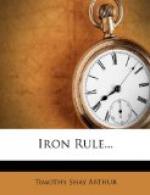It was thus that the cold-hearted father settled, with his own conscience, this question of wrong toward his child. And yet he was a man who prayed in his family, and regularly, with pious observance, attended upon the ordinances of the church. In society he was esteemed as a just and righteous man; in the church as one who lived near to heaven. As for himself, he believed that severity toward his boy, and intolerance of all the weaknesses, errors, and wayward tendencies of childhood, were absolutely needed for the due correction of evil impulses. Alas! that he, like too many of his class, permitted anger toward his children’s faults to blind his better judgment, and to stifle the genuine appeals of nature. Instead of tenderness, forbearance, and a loving effort to lead them in right paths, and make those paths pleasant to their feet, he sternly sought to force them in the way he wished them to go. With what little success, in the case of Andrew, is already apparent.
Angry at the unjust punishment he had received, the boy remained alone in his room until summoned to dinner.
“He doesn’t want anything to eat,” said the servant, returning to the dining-room where the family were assembled at the table.
“Oh, very well,” remarked the father, in a tone of indifference, “fasting will do him good.”
“Go up, Anna,” said Mr. Howland to the servant “and tell him that I want him to come down.”
That word would have been effectual, for Andrew loved his mother; but Mr. Howland remarked instantly:
“No, no! Let him, remain. I never humor states of perverseness. If he wishes to fast he can be gratified.”
Mrs. Howland said no more, but she took only a few mouthfuls of food while she sat at the table. Her appetite was gone. After dinner she went up to Andrew’s room with a saucer of peaches and cream. The moment she opened the door the lad sprung toward her, and while tears gushed from his eyes, he said—
“Indeed, indeed, mother, I was not to blame! Bill Wilkins was going to beat me—and you know, he’s a large boy.”
“But you might have killed him, Andrew,” replied the mother, with a gentle gravity that, in love, conveyed reproof. “It is dangerous to throw stones.”
“I had to defend myself, mother. I couldn’t let him beat me half to death. And I told him to keep off or I would strike him with the stone. I’m sure I wasn’t to blame.”
“Why, was he going to beat you, Andrew? What did you do to him?” asked Mrs. Howland.
“I’ll tell you, mother,” replied the boy. “He was pounding with his fist a poor little fellow, not half his size, and I couldn’t stand and see it if he was a bigger boy than me. So I took the little boy’s part; and then he turned on me and said he’d beat the life out of me. I ran from him and tried to get away, but he could run the fastest, and so I took up a stone and told him to keep off. But he was mad, and wouldn’t keep off. So I struck him with it, and, mother, I’d do it again (sic) to-moorow. No boy shall beat me if I can defend myself.”




